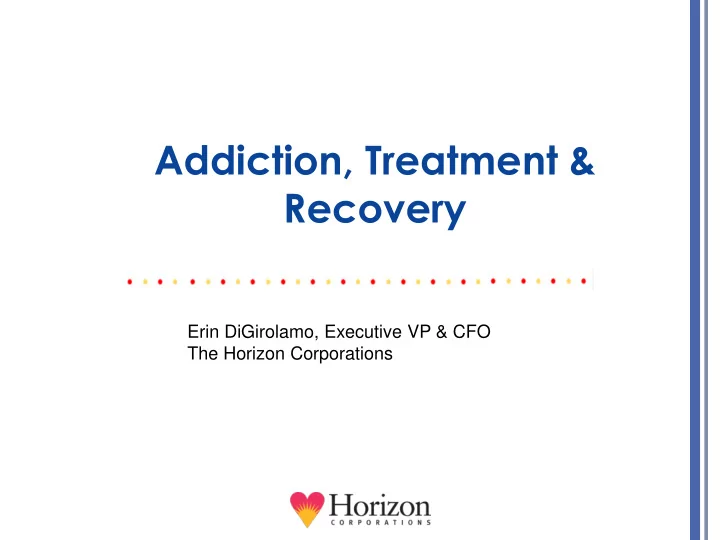

Addiction, Treatment & Recovery Erin DiGirolamo, Executive VP & CFO The Horizon Corporations
Agenda • Disclaimer • Stigma • Incidence rate • Treatment Options
Behavioral health disorders What we want them to be: What it is: • Someone else’s problem • Everyone’s problem • An event, like a broken • Chronic disease hip • Curable • Sustained recovery is possible but there is no cure
Risk Factors of Addiction Factor Evidence Genetic Predisposition Established Risk Factor Family History Established Risk Factor Prenatal Exposure (animal models) Established Risk Factor Early Onset Age of Substance Abuse Established Risk Factor Adverse Childhood Experiences, Physical/Sexual Abuse ? Strong Evidence ADHD, School Problems, Conduct Disorders ? Strong Evidence Personality (i.e. “Addictive Personality”) X NOT A RISK FACTOR
Behavioral Health • One in four people suffer from a behavioral health disorder. • Of those 75% do not seek treatment. • Untreated addiction and mental health disorders cost HC plans and society more than treated. (2017 Buffalo ER statistics indicate BH was the #1 reason for admission.)
Challenge: Startling Statistics
Opiate Dependence- why don’t they just stop? WHATEVER IT TAKES TO NOT GET SICK
Treatment includes: • Counseling (multiple levels) • Family involvement • Self-help • Drug Court • Medication Assisted Therapy • Sustained involvement
LEVELS OF CARE MEDICATION-ASSISTED TREATMENT Detox- Stabilization Suboxone Inpatient Zubsolv Residential Vivitrol Intensive Outpatient Methadone Outpatient 12-step
Detox • This is a crisis stabilization level of care • Person is often admitted in active drug use or beginning stages of withdrawal • Sometimes needs medical oversight to safely detox or needs medical assisted treatment to motivate them to do it • Typically 3-5 days • Think of this as the spell in the ER and surgical unit for a hip replacement after a horrible car accident.
Inpatient • Inpatient services are bedded, 24/7 programs where use of drugs and/or alcohol is severe enough that the person cannot maintain stability outside of a 24/7 setting. This service is offered to those in need of a hospital like setting. • Bedded programs offering all services on site including SUD, some medical, and psychiatric • Length of stay varies from 14-30 days typically • 24/7 facilities staffed by professional personnel at all times • Think of this as the “sub - acute” unit after a hip replacement
“Intensive Residential” • Intensive Residential is another variant of Inpatient. It is considered the most intensive level of care in our community with length of stay from 3-9 months with 24/7 clinical and medical staffing. It’s what people think of when they hear someone is “in rehab”. • Persons in need of this level of care still need support for their SUD issues in a bedded setting but are stable enough to go about most of their day in the community. • Lower levels of residential level care are halfway house and supportive living which are typically not consider medical treatment (not covered service) • Halfway House/Community Residence services — staffed 24/7 • Supportive Living services — some staffed 24/7 but many have variable staffing models
Outpatient • Outpatient services are the most commonly used level of care and serve those with substance problems that can be managed with 1 hour visits to an agency 3-4 times per week in most cases. Least intensive level of care • Non bedded day to day services • Consumers typically have scheduled amount of sessions per week • Most organizations operate typical business hours with evening hours offered at many
Where to start • Make sure your Plan Document covers the right services • need to have the benefit for “stabilization in a residential setting” and “rehabilitation in a r esidential setting”. Too many plans use old vernacular only allowing for “detox” and “Inpatient” which is hard to find and much more costly • Have a plan before the crisis hits • Refer person for Screening and Assessment to a licensed behavioral health provider
Thank You! Questions? Please contact: Erin DiGirolamo, CFO Mallory Bryant, Residential Admissions Director (716) 831-2700 www.horizon-health.org Together for Recovery. Changing Lives. Saving Lives.
Recommend
More recommend